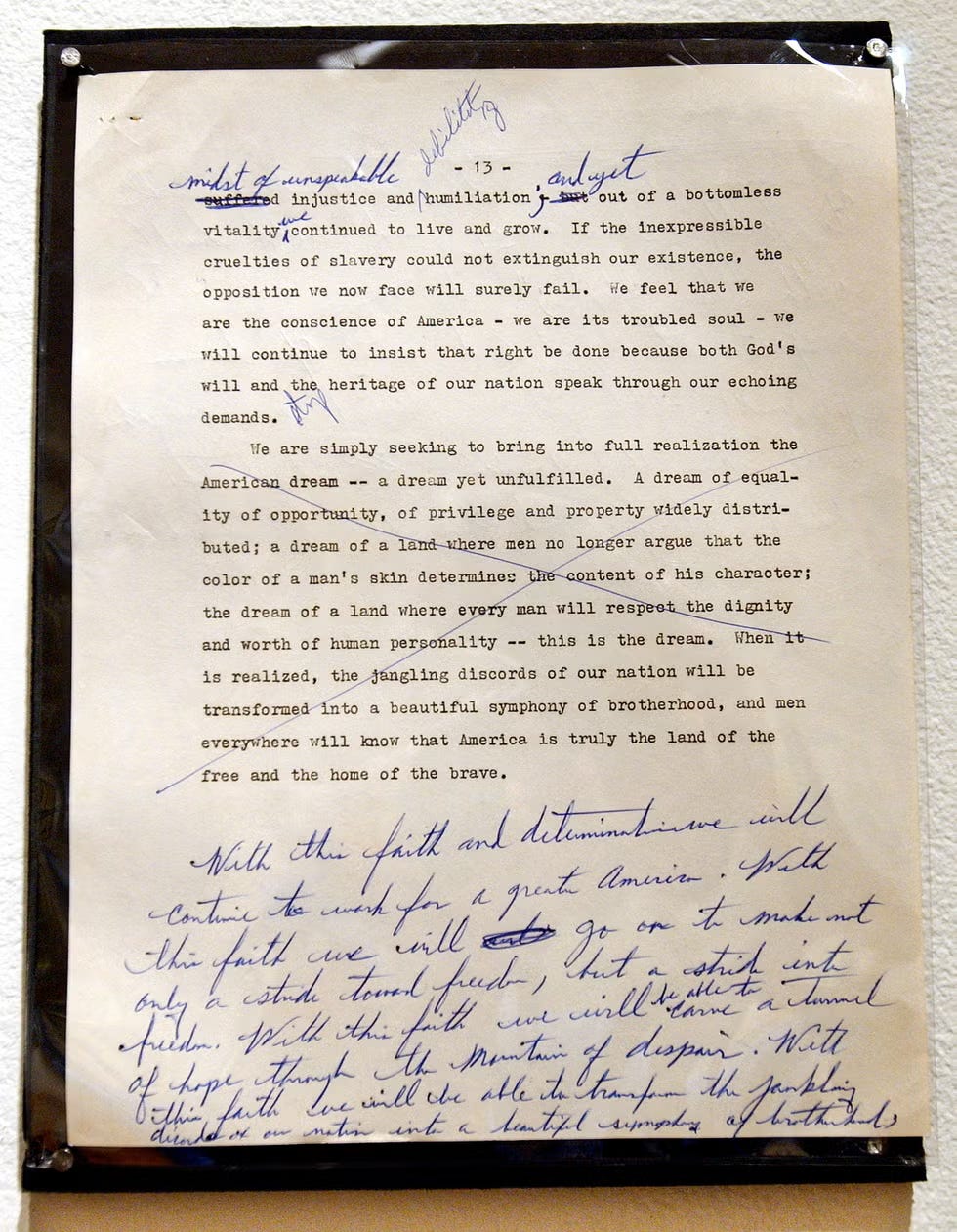The Sunday Signal: Why Great Leaders Never Read the Script
Essential insights on speaking, leadership and accountability - Issue #28 – Friday 24 October 2025
The Bottom Line Up Front
My Yorkshire Post column this week explored what every leader eventually learns the hard way: communication is not decoration. It is survival.
The best speeches are not performances polished to death by PR. They are moments of truth. They make people feel seen. They make companies human again. And when leaders lose that connection, when the script becomes armour instead of a bridge, the downfall is never far behind.
I have stood at the lectern, notes shaking, sweat on my hands, and felt the distance that over-preparation creates. I have also seen what happens when a voice finds its rhythm and a room falls still. The difference between the two is everything.
This week’s Sunday Signal is about that difference, the courage to speak plainly when it matters. It begins with what I have learned about finding your authentic voice, moves to the science of why unscripted speeches reach hearts that polished ones never can, and ends with the arrogance that destroys trust when leaders start sneering at the very people who made them successful.
If words can build empires, they can also bury them.
Finding Your Voice
From my weekly column in the Yorkshire Post
I watched a colleague present when his notes failed. The slides worked. The script did not. For a moment there was panic. Then he looked up, smiled and spoke from memory. The room changed. Without notes, he sounded like himself. Natural, human, alive. The audience leaned in. The failure of his script made him real.
It reminded me of my own experiences. The best feedback I have ever received always came after the least scripted talks. I once arrived at an event not realising I was the keynote speaker. Twenty minutes, no slides, no notes, just conviction. People said it was the most authentic thing they had heard from me.
The greatest speech of all time proves the same point. Martin Luther King’s I Have a Dream was typed, edited and rehearsed, but the words history remembers were improvised. Gospel singer Mahalia Jackson called out, “Tell them about the dream.” King looked up, set his paper aside and spoke from instinct. The second half, the part that changed the world, was not read. It was lived. Clarence B. Jones, his speechwriter, said to those standing nearby, “These people don’t know it yet, but they’re about to go to church.”
The lesson for any leader is simple. Authentic communication cannot be scripted. Most corporate speeches are safe and forgettable. Committees polish the life out of them until only gloss remains. People do not remember gloss. They remember belief. Public speaking is not theatre. It is a conversation at scale. Plan your argument, know your stories, then put the notes aside and speak from truth. That is when people really listen.

Ratner’s Ten Seconds
A few years ago, I arrived at the Cutlers’ Hall in Sheffield to deliver a keynote. I had spent hours refining the text, printed it neatly and placed it in a folder. When I stood up and put on my glasses, I realised they were the wrong pair. The words blurred. My heart sank. My wife’s face in the audience said it all. I stumbled through.
Never again. I will always prepare, but now I speak freely. I plan the structure, not the sentences.
Gerald Ratner did the opposite. In 1991 he stood before six thousand business leaders at the Royal Albert Hall. His speech had been written, circulated and signed off by advisers. Three minutes in he called one of his products “total crap” and joked that a prawn sandwich would probably outlast a pair of earrings. The audience laughed. The next morning the papers did not. Within weeks, the company’s value collapsed by hundreds of millions. Within a year, Ratner was gone. “Doing a Ratner” became a byword for public self-destruction.
Why does an improvised King lift a nation while a perfectly prepared Ratner destroys a business? Tim Harford offers an answer in Cautionary Tales. King’s freedom came from mastery. He knew his material so deeply that he could improvise around it. The script became scaffolding, not a prison. When the moment demanded something greater, he could step away from the paper and reach the people.
Neuroscience now tells us why that works. Charles Limb, a surgeon and jazz saxophonist, studied improvisation by placing rappers and musicians inside MRI scanners. The results were clear. When people improvise, large sections of the prefrontal cortex, the part of the brain that filters and self-censors, temporarily shut down. The inner critic goes quiet. Creativity and emotion flood in. The brain moves from editing to expressing.
Improvisation is not guesswork. It is prepared instinctively. The best extemporaneous speakers are those whose knowledge is so embedded that they can let go of control without losing clarity. The act of speaking becomes what Miles Davis called “the freedom and space to hear things.” You stop performing and start listening to the room, to the crowd, even to yourself.
A script feels like safety. It is often a straitjacket. The science shows that letting go unlocks both empathy and flow. The audience senses it immediately. Their attention shifts from judging to joining. The speech becomes a dialogue.
Public speaking, like leadership, is an act of trust. The more you prepare, the more you earn the right to improvise. That is the paradox. Only those who know their material completely can afford to be spontaneous. King was free because he had done the work. Ratner was trapped by his lines because he had not done the thinking behind them.
The rule still stands: prepare like a professional, perform like a person. Speak to the room you are in, not the page you wrote last night.
The Arrogance of Power
Ratner’s ten seconds should have been warning enough, but arrogance spreads easily. You see it whenever leaders start treating customers as inconveniences rather than lifelines.
Michael O’Leary of Ryanair once called his passengers “idiots.” When people complained about fees, he told them to “f*** off.” The bravado made headlines and, for a while, profits. But every insult compounds a debt that money cannot repay, the erosion of trust.
Football suffers the same disease. And it hurts when it reaches home. I am a Sheffield Wednesday supporter. My family has followed the club for generations. The badge still means something, even after all the pain. That is why it was so hard to watch the recent episode with our chairman, Dejphon Chansiri. His decision to tell fans to contribute to a tax bill if they truly cared was not just tone-deaf. It was a betrayal of the relationship between club and community.
Supporters are not customers. They are the heartbeat of a club. They travel the country at significant cost, buy the shirts, and pass the history down through the generations. They are the reason a club survives bad owners, bad decisions and bad seasons. To treat them as a revenue stream rather than the reason the lights stay on is not leadership. It is arrogance.
The list of offenders is long. Matt Barrett at Barclays told customers not to use his own credit cards. Chip Wilson at Lululemon blamed women’s bodies for his product’s flaws. Each time the mask slips it exposes the same truth: success has replaced humility.
Leadership is not license. It is stewardship. You can be tough without being toxic. You can set standards without sneering. You can joke without punching down. The moment a leader starts mocking the people who made them successful, their authority is already gone.
Empathy is not weakness. It is strategy. The simplest fix is also the hardest: spend time where your power comes from. Listen to the people who experience your decisions. Then act on what they tell you. A single visible change built on genuine listening repairs more trust than a thousand apologies written by PR.
Final Thought
Finding your voice is not about performance. It is about courage. The courage to look up from the page, to let the inner critic fall silent and to speak from conviction.
King proved that great oratory is not about being perfect. It is about being present. Ratner proved that clever lines and polished scripts cannot mask contempt. O’Leary, Chansiri and others prove that arrogance still sells until it doesn’t. Every empire that forgets its audience collapses the same way: first in tone, then in trust, then in time.
Words reveal everything. They show who you serve and who you secretly despise. A speech is not something to survive. It is a promise to keep.
Prepare deeply. Speak honestly. Respect the people who made your success possible. Because the microphone is always borrowed, and the crowd decides when to take it back.
And for those of us who still stand on the Kop at Hillsborough and dream of better days, we know that pride, like trust, cannot be bought. It has to be earned back, one honest word at a time.
Read The Sunday Signal first every Friday on Substack. Public release follows on Sunday.
Sources and further reading


